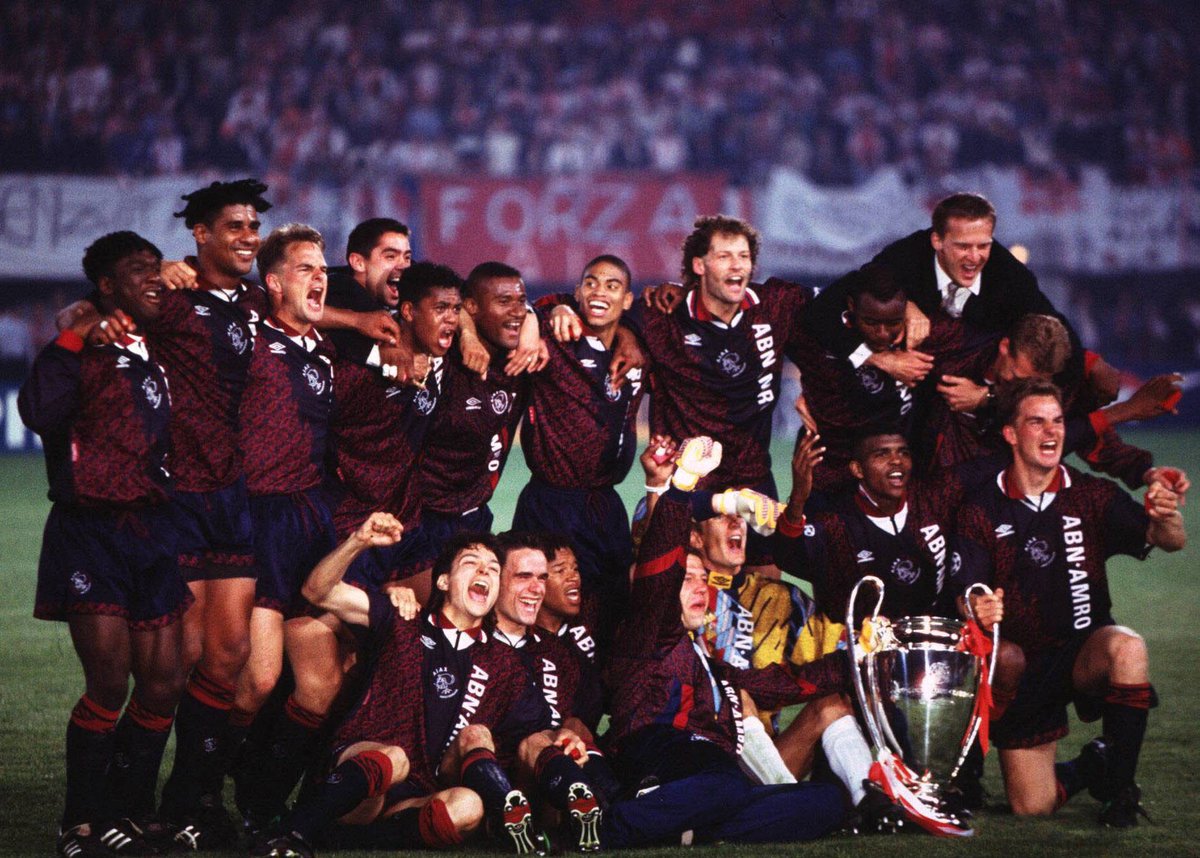Of all the winners of the modern Champions League, few teams are remembered as fondly as the Ajax side of the mid-1990s.
The names aren’t just familiar, they’re the stuff of legend – the team almost springs to most fans’ minds fully formed, such was their era-defining brilliance.
And yet, within a couple of years, that great side was no more, torn apart by forces beyond the Dutch club’s control, leaving Ajax without a side able to compete for European silverware for decades.

Now, more than 20 years after their Champions League win and the final defeat that followed it 12 months later, Ajax are back in the big time. Their young side will take on Manchester United in the Europa League final on Wednesday and, should they win it will send a message that Ajax are once again a force in Europe.
There are startling similarities between the Ajax side of today and the one that Louis van Gaal took to glory in 1995.

But while the current crop will be desperate to emulate the glory of their predecessors, they will have to take heed of what happened after.
Like the side that will play in Stockholm on Wednesday, the Ajax side of 1995 was young, and largely homegrown.
Of the side that started the final, nine were dutch, with most of those coming through the famous academy. Frank Rijkaard had been away, had success in Italy, and come back, while Danny Blind – father of United utility man Daley – had been brought in from Sparta Rotterdam nine years earlier.
Goalkeeper Edwin van der Sar and Marc Overmars had played youth football elsewhere, but joined Ajax as teenagers.
But for the most part this team had come through together. Michael Reiziger, Edgar Davids and Overmars were all 22, and had come through together.
Frank and Ronald de Boer, both 25, were a few age-groups ahead, while Clarence Seedorf, just 19, was a few behind. Van der Sar, too, was 25, and part of a core that had been together for a while, despite their tender age.
Even Jari Litmanen, the Finnish star who took over the club’s No 10 jersey from Dennis Bergkamp, had been with the side from the age of 21, and progressed from the reserves with the homegrown youngsters.
Seven of those players would start the final the next year, losing narrowly to Juventus, with subs Winston Bogarde and Nwankwo Kanu moving into the starting XI and Patrick Kluivert, the teenager who scored the winner in 1995 again coming off the bench. They were joined by two more academy graduates, albeit of very different eras, Sonny Silooy and Kiki Musampa.
Ajax narrowly failed to become the first team to defend the Champions League, yet in 1996 they ought to have been on top of the world, the dominant force in Europe.
Instead, it all came crashing down, because of a ruling that took place between the two finals.

In December 1995 the European Court of Justice ruled on the case of Jean-Marc Bosman, a decision that changed the face of football, allowing for free transfers at the end of contracts.
It was a move that hit unprepared clubs hard, and perhaps none harder than Ajax.
Seedorf had already gone to Sampdoria after the final of 1995 for a fee of about £1.5m, and Rijkaard retired immediately after the final, but it was in the summer of 1996 that the wheels really fell off.
Davids was the first high-profile player to benefit from the ruling, joining his former team-mate in Italy and signing for AC Milan. Michael Reiziger did the same. A year later Kluivert made the same journey, also for free, alongside Bogarde.

In two years, four of Ajax’s best young players had gone to the same club, all for free. The core of the team was no more.
The exodus continued with Kanu also moving to Milan in 1996, this time to city rivals Inter, and George going to Spain, and Real Betis for £4.5m, while Marc Overmars went to Arsenal in 1997 – although Ajax did at least get a fee of around £7m for the winger.
In 1999, just four short years after their glorious triumph and only three after their second consecutive final, not one of the players involved in the final was left. Both De Boer’s and Litmanen went to Barcelona, Van der Sar joined Juvenuts, and Blind finally retired. Ajax finished sixth in the Eredivisie, their worst position since 1965.

Since that team fell apart Ajax have never again been a force in Europe. They have not won a European trophy and have made it out of the Champions League group stage just twice – the last time in 2006.

Young players continue to be produced, going on to greatness all over the world, but, until this season, never achieving much on the continental stage while still at the club.
On Wednesday, the likes of Davy Klaasen, Kasper Dolberg, Bertrand Traore and Justin Kluivert can add their names to the list of legends alongside the class of 1995.

But if Ajax are to return to the global stage permanently, they will have to hope that this generation can stick around for a little longer than the last great side
Culled from Daily mail






COMMENTS